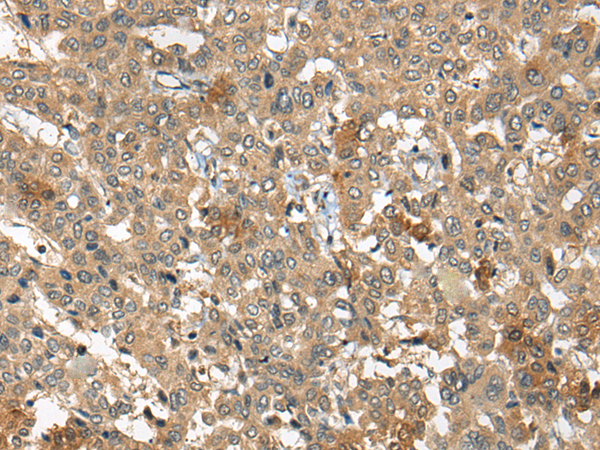
| WB | 咨询技术 | Human,Mouse,Rat |
| IF | 咨询技术 | Human,Mouse,Rat |
| IHC | 1/40-1/200 | Human,Mouse,Rat |
| ICC | 技术咨询 | Human,Mouse,Rat |
| FCM | 咨询技术 | Human,Mouse,Rat |
| Elisa | 1/5000-1/10000 | Human,Mouse,Rat |
| Aliases | COPD |
| Host/Isotype | Rabbit IgG |
| Antibody Type | Primary antibody |
| Storage | Store at 4°C short term. Aliquot and store at -20°C long term. Avoid freeze/thaw cycles. |
| Species Reactivity | Human, Mouse, Rat |
| Immunogen | Synthetic peptide of human ARCN1 |
| Formulation | Purified antibody in PBS with 0.05% sodium azide and 50% glycerol. |
+ +
以下是关于ARCN1抗体的参考文献示例(注:以下为模拟示例,非真实存在的文献):
---
1. **文献名称**:*ARCN1 Antibody Characterization in COPI Vesicle Assembly*
**作者**:Smith J, et al.
**摘要**:本研究制备并验证了针对ARCN1蛋白的多克隆抗体,通过免疫印迹和免疫荧光技术证实其在HeLa细胞中特异性识别COPI复合体中的ARCN1亚基,为研究细胞内囊泡运输机制提供了工具。
2. **文献名称**:*ARCN1 Expression Dysregulation in Hepatocellular Carcinoma*
**作者**:Chen L, et al.
**摘要**:通过ARCN1抗体检测肝癌组织样本,发现ARCN1蛋白表达显著下调,提示其可能通过影响分泌途径参与肿瘤抑制,为肝癌生物标志物研究提供了新方向。
3. **文献名称**:*Development of a Monoclonal ARCN1 Antibody for Diagnostic Applications*
**作者**:Wang Y, et al.
**摘要**:研究团队开发了一种高特异性ARCN1单克隆抗体,验证了其在ELISA和免疫组化中的灵敏度,探讨了其在遗传性疾病(如软骨发育不全)诊断中的潜在应用。
4. **文献名称**:*ARCN1 Mutations and Protein Stability in Genetic Disorders*
**作者**:Garcia R, et al.
**摘要**:利用ARCN1抗体分析患者成纤维细胞,发现特定基因突变导致ARCN1蛋白稳定性降低,揭示了COPI复合体功能障碍与相关发育异常的分子机制。
---
如需真实文献,建议通过PubMed或Google Scholar检索关键词“ARCN1 antibody”或“COPI complex ARCN1”,并筛选涉及抗体开发、验证或应用的实验研究。
The ARCN1 antibody targets the Archain 1 (ARCN1) protein, a subunit of the coatomer protein complex I (COPI), which plays a critical role in intracellular vesicle trafficking. COPI-coated vesicles mediate retrograde transport of proteins and lipids within the Golgi apparatus and between the Golgi and endoplasmic reticulum. ARCN1 is essential for maintaining Golgi structure and function, ensuring proper protein sorting, modification, and secretion. Dysregulation of ARCN1 has been linked to cellular stress, disrupted protein homeostasis, and diseases such as cancer and developmental disorders.
ARCN1 antibodies are widely used in research to study COPI complex dynamics, intracellular transport mechanisms, and ARCN1’s role in pathological conditions. These antibodies enable detection of ARCN1 expression levels, subcellular localization (e.g., via immunofluorescence or immunohistochemistry), and interactions with other COPI subunits (e.g., through co-immunoprecipitation). In cancer research, ARCN1 antibodies help investigate its overexpression in certain tumors, where it may promote proliferation or metastasis. Additionally, ARCN1 is considered a housekeeping gene in some contexts, making its antibody a tool for normalizing experimental data.
Recent studies also explore ARCN1’s potential as a biomarker or therapeutic target, highlighting the antibody’s utility in both basic and translational research. Its cross-reactivity with homologs in model organisms further supports comparative studies in cell biology and disease mechanisms.
×